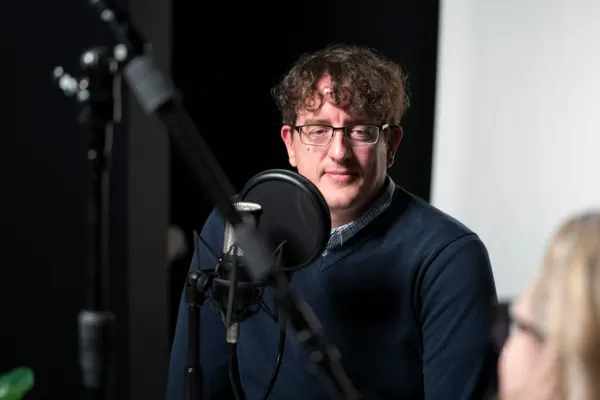St. Jude Family of Websites
Explore our cutting edge research, world-class patient care, career opportunities and more.
St. Jude Children's Research Hospital Home

- Fundraising
Acute Promyelocytic Leukemia (APL) Treatment
Also called: APL, acute myeloid leukemia (AML) M3; leukemia, acute promyelocytic
Acute promyelocytic leukemia (APL) is cancer of the blood and bone marrow. Bone marrow is a soft, sponge-like tissue in the center of many bones. It makes blood cells.
In APL, the bone marrow makes too many blood cells that do not work correctly. People with APL do not have enough healthy white blood cells and platelets. As a result, they are at high risk for infection and bleeding.
APL is a form of acute myeloid leukemia. About 1% (1 in 100) of childhood leukemias are APL. It is most often diagnosed in children of Hispanic or Mediterranean descent. It is rare in children younger than age 3. The average age of diagnosis is 8–10 years.

"When you're trying to navigate all those logistical difficulties, my first piece of advice is that it is OK to ask for help. It is really important to ask your community for help so that they can come alongside you and take some of that burden off of you."
- Jason Winkle
Symptoms of APL may include:
- Bleeding that is hard to stop, even from a small cut
- Blood in the urine
- Heavy nosebleeds
- Bleeding gums
- Easy bruising
- Fever
- Infections
- Low red blood cell count
- Paleness
- Feeling tired
- Loss of appetite
- Unexplained weight loss
Acute promyelocytic leukemia causes
Most cases of APL are caused by changes in 2 genes. A gene change that causes the gene not to work properly is called a mutation. This mutation causes an abnormal protein. The mutations are not inherited.
Acute promyelocytic leukemia diagnosis
Lab tests can show if the abnormal protein is in the blood. Tests to diagnose leukemia in children also include:
- Blood tests, including complete blood count and blood chemistry
- Bone marrow biopsy
- Chest x-ray
Acute promyelocytic leukemia treatment
The main treatment for APL includes 2 medicines: all-trans retinoic acid (ATRA) and arsenic trioxide. ATRA is similar to vitamin A.
Treatment is based on whether the child’s leukemia is standard risk or high risk. Risk is based on the number of white blood cells a child has at diagnosis.
The goal of treatment is to get rid of the cancer with as few side effects as possible. A high-risk case has a higher chance of not responding to treatment or coming back after treatment. So, a child with a high-risk form of APL may get more medicines than a child with a low-risk case.
Treatment of APL has 2 phases:
- Induction. Children get treatment with ATRA and arsenic trioxide. High-risk patients may also get dexamethasone and chemotherapy (usually idarubicin). This phase may take 1–2 months.
- Consolidation and maintenance. This phase includes treatment with ATRA, arsenic trioxide, and chemotherapy. The goal is to get rid of any remaining cancer cells. This phase may take several months. The length of this treatment phase varies. It depends on the risk group.
Researchers are studying if using ATRA and arsenic trioxide, with or without the medicine gemtuzumab ozogamicin (GO), can work well without needing more chemotherapy. GO is an immunotherapy medicine.
If APL returns, most children can be successfully treated with arsenic trioxide. It may be combined with chemotherapy and stem cell (bone marrow) transplant.
Acute promyelocytic leukemia prognosis
More than 90% (9 in 10) patients treated for APL are considered cured.
Acute promyelocytic leukemia care at St. Jude
- St. Jude offers a dedicated team of specialists to meet the needs of children with APL, including:
- Surgeons, doctors, and nurses who treat this cancer
- Doctors who specialize in radiation therapy and pathology (making a diagnosis by looking at tumor tissue under the microscope)
- Experts in radiology and nuclear medicine
- Genetic counselors
- Clinical dietitians
- Child life specialists
- Psychologists
- Researchers and scientists
More reasons to choose St. Jude for care include:
- We are consistently ranked among the best childhood cancer centers in the nation by US News & World Report.
- At St. Jude, we have created an environment where children can be children and families can be together.
- We lead more clinical trials for childhood cancer than any other hospital in the U.S.
- St. Jude is the only National Cancer Institute–designated Comprehensive Cancer Center just for children. A Comprehensive Cancer Center meets rigorous standards for research that use the most advanced treatments available. Our goal is to treat every develops new and better approaches to prevent, diagnose, and treat cancer.
- The nurse-to-patient ratio at St. Jude is about 1:3 in oncology and 1:1 in the Intensive Care Unit.
- Patients may be able to get expert, compassionate care and treatment closer to their homes through the St. Jude Affiliate Program.
Acute promyelocytic leukemia clinical trials
St. Jude offers clinical trials and cancer research studies for children, teens, and young adults for acute promyelocytic leukemia. Learn more about clinical research at St. Jude.
Our team includes doctors trying to cure the disease but also services in nutrition, rehabilitation, nursing, education, psychology, social work, and child life. This expert team supports each child through diagnosis, treatment, and recovery.
There are no open clinical trials for acute promyelocytic leukemia at this time.
Browse open clinical trials
Seeking treatment at St. Jude
Patients accepted to St. Jude must have a disease we treat and must be referred by a physician or other qualified medical professional. We accept most patients based on their ability to enroll in an open clinical trial.
Contact the Physician / Patient Referral Office
Call: 1-888-226-4343 (toll-free) or 901-595-4055 (local) | Fax: 901-595-4011 | Email: referralinfo@stjude.org | 24-hour pager: 1-800-349-4334